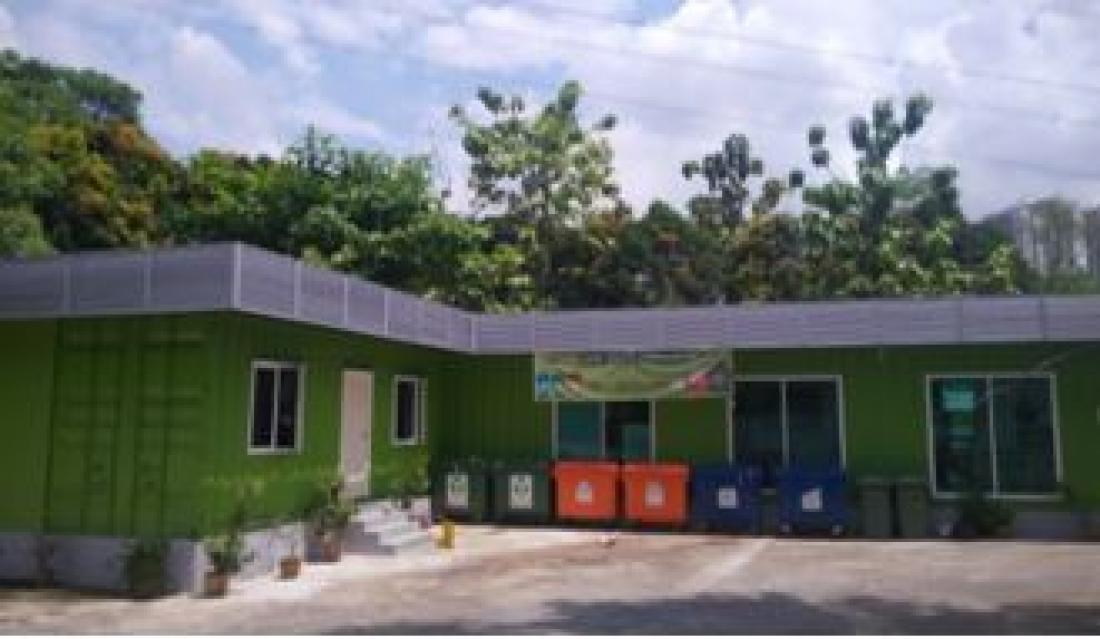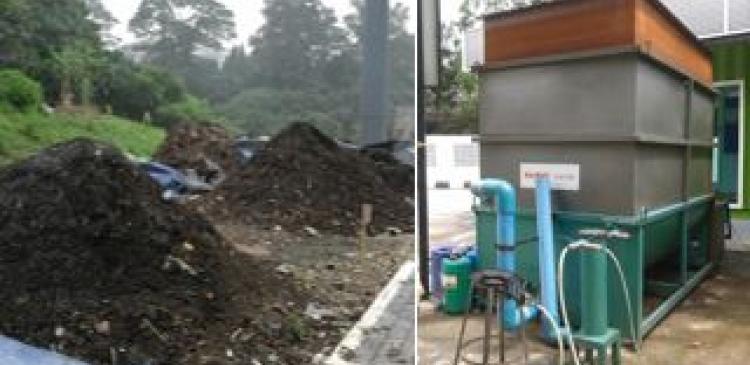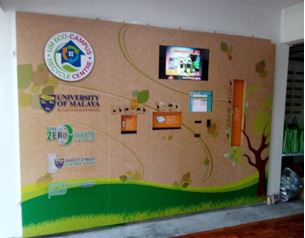UM ZWC Center in UM campus
Solid waste generation in Malaysia is increasingly rising, from 30,000 tonnes per day in 2013 to 38,000 tonnes per day today. However, the recycling rate in Malaysia which was officially announced by the Federal Government in 2013 is 10.5%. There are almost 176 landfills in the country, but only eight are sanitary landfill, leaving the rest merely open dumpsite.
In the 10th Malaysia Plan, the government targeted the recycling rate to be 22% by 2020. It is essential to achieve this recycling rate in order to reduce the negative environmental impact, reducing GHG emissions and to develop a sustainable solid waste management in Malaysia which is on par with the developed countries.
With the increasing numbers of public and private universities in our country, the population of each campus is significant and the waste generated will have impact on the environment if not properly controlled. With the generation of waste between 5-8 tonnes per day, it is estimated that waste coming from academic institutions amounted to approximately 1,500 tonnes per day, comprising approximately 5-10% of the total waste generated in Malaysia.
As the premier university in the country, University of Malaya (UM) is also embracing the move towards sustainability. The University of Malaya Zero Waste Campaign (UM ZWC) aims to spearhead the development of an integrated and sustainable waste management model in UM with the following objectives:
• To develop policy and innovation systems to divert organic waste (from disposal in landfill) for nutrient recycling (composting) and energy recovery (anaerobic digestion).
• To streamline recycling activities and strategize efforts to increase recycling rates.
• To create awareness and inculcate best practices of waste separation at source among campus communities.
• To serve as a long term campaign to achieve an integrated waste management model and ultimately a zero waste campus.
• To initiate projects, research projects and schemes to achieve the intended waste management and recycling goals.
UM ZWC aims to spearhead the development of an integrated and sustainable waste management model in UM. The history of UM ZWC rooted from a students’ group, “VeeCYCLE” which developed a recycling project in Faculty of Engineering with “PRO bin” to promote the best practice of waste segregation at source. The inception of Green Bag Scheme in 2010 was inspired by the fact that food waste is the major problem in Malaysia. Subsequently, a composting center was developed with funding from CIMB Foundation, support from UM top management especially Deputy of Vice Chancellor (Development) and JPPHB (Department of Development and Assets Maintenance) as well as technical assistance by IGES (Institute of Global Environment Strategies) in 2011.
UM ZWC signed a MoU (Memorandum of Understanding) with CH Green Sdn Bhd in 2013 for a research collaboration on COWTEC anaerobic digestion (AD) system. In 2014, UM ZWC cooperates with Life Line Clothings Sdn Bhd to introduce an used clothes collection program for reuse/recycling and TSP Waste Management Sdn Bhd for separate collection of wood waste for off-site energy recovery (biomass fired power plant at Rasa, Selangor).
In 2015, UM ZWC initiated the collaboration between SWCorp (National Solid Waste Management and Public Cleansing Corporation) and UM on UM ZWC projects by signing a MoU. JPPHB established a UM ZWC center with container-reuse concept, installed a weighbridge station. UM ZWC also collaborates with Climb Optima Sdn Bhd for a research on small-scale in-vessel composter.
In 2017, UM ZWC develops an intelligent recycle center with Coindex Sdn Bhd to promote recycling behavior and inculcate best practice of recyclables drop-off with this innovative automated recycle center located at Dewan Kuliah A&B, PASUM. With the new recycling system, UM community can send their source segregated recyclables to the center for conversion into green points which can be used to claim goodies such as compost. Besides, with the larger capacity chipper-shredder machine from JPPHB, the green waste composting scale is expected to be increased from the current 1.5 ton per month to about 5 ton per month.
Moreover, with the RMK-11 budget from JPPHB, the current UM ZWC composting site will be upgraded with concrete platform and proper leachate collection and re-use mechanism. The current UM waste transfer station beside the UM ZWC center will also be upgraded and extended. The intelligent recycle center is anticipated as the cornerstone to develop a formal recycling separate collection in the campus of UM.
UM ZWC’s evolving achievements since 2009 are manifold. With continuing financial assistance for structural development, hiring of staff and administrative support from higher management, UM ZWC has been able to do more with very little, and can only continue to grow. Throughout the past eight (8) years, UM ZWC received numerous visitors from various organizations (academic, government, private sector and NGOs (Non-Government Organizations), as well as providing supports and facilities for students to carry out research related to organic waste treatment and waste characteristic studies.
Besides environmental benefits, UM ZWC also brings various benefits such as academic research opportunities for UM, contributes in UM LCCF (Low Carbon City Framework) target and serves as platform to improve students’ soft skill and entrepreneur skill. Furthermore, UM ZWC has assisted several local communities to develop communal composting project through various collaboration and partnership. Multi-stakeholders participation, support from top management and industrial collaboration are the key factors that are able to drive the development of a sustainable waste management model in UM campus.
Inception of UM ZWC composting project in September 2011 has introduced various projects which diverted over 600 tonnes of solid waste from disposal in landfill. The waste streams collected separately are food waste and green waste for composting and anaerobic digestion, used clothes for reuse and recycling, wood waste for energy recovery for a local independent power plant, materials recyclables for re-processing as secondary materials and e-waste for recycling.
From analysis using LCA (Life Cycle Assessment) approach, a total of 2,505 ton of carbon dioxide emission has been avoided by projects under UM ZWC. In term of social benefits, UM ZWC has received more than 9,000 visitors from various local and international organizations since inception in year 2011. Every year, there are about 60-70 delegates of visit to UM ZWC center with about 10-50 person per delegate. These visitors come to UM ZWC for learning of knowledge in biological treatment such as composting and anaerobic digestion, separate collection and integrated waste management in a campus level.
In the context of economic dimension, with the reduction of about 6-7 pulls of open top bin hauled to landfill, a total of RM 97,757 of waste disposal cost has been saved since inception. Besides, a total of RM 49,058 amount of proceeds from selling of used clothes from UM campus were donated to several charity bodies. Furthermore, until year 2016, the total donation in-kind by industrial collaborators to UM ZWC is about RM 200,000.
UM ZWC aims to increase the current recycling capacity of 15-20 ton/month to more than 30 ton/month (recycling rate: 20%) by year 2020 as the first phase of the campaign with increasing capacity of organic waste composting and formalization of recycling collection as well as robust waste tracking and data collection mechanism. Institutionalization of UM ZWC as a waste management unit and adoption of integrated waste management related policy (such as waste minimization) in campus will be the next strategy to further strengthen the campaign’s agenda.
Development of waste sorting and treatment facilities such as MRF (materials recovery facility) and MBT (mechanical-biological treatment) will be another strategy in further increase the recycling rate to 30-40% in the second phase of UM ZWC during the period of year 2020-2030.
On-site treatment of residual waste and strengthening waste minimization strategy with charging scheme will be the strategy for the phase three of UM ZWC (year 2030-2040) to attain the intended landfill diversion goal setting with “zero waste” policy, with 40% recycling target and overall 60% landfill diversion.
In the next 5-10 years, UM ZWC will play a vital role to formalize the collection of recyclable materials in UM and further increase the organic waste recycling, while kitchen waste will be treated anaerobically with AD and aerobically with in-vessel composting. Collaborations with government agency, private entity and local and foreign organizations will be intensified to introduce more environmental friendly waste sorting, recovery and treatment technologies in UM.
Contact Information
Associate Prof. Dr. Sumiani Binti Yusoff
Department of Civil Engineering
Faculty of Engineering, University of Malaya,
50603 Kuala Lumpur, Malaysia.





